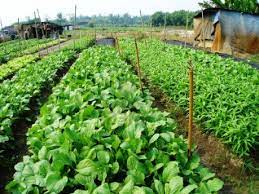The discourse continues on how to boost food production in the country. This is because a virile economy thrives when the citizenry is active and full of life as a result of healthy living made possible with steady cultivation of crops and animal breeding. In general, agriculture is key to the promotion of national development and it is in view of this that the importance of genetic variation and nanotechnology have been stressed. However, what these kinds of interactions can make the desired impact is for relevant stakeholders to implement decisions taken, otherwise, it would amount to mere talk shows.
Therefore, to ensure adequate provisions for future generations and sustainable crop production, a Professor of Plant Breeding and Genetics, Francis Showemimo, has called for access to scientific data, resources, and collaborative platform for breeders to be able to quickly and efficiently identify the genetic variations that would allow them develop new varieties with improved traits. He made this call while delivering an inaugural lecture, titled: “Science-Art Interface: A Plant Breeder’s Perspective”. Prof. Showemimo had argued that funding and lack of adequate infrastructure are major problems militating against breeding breakthroughs, hence the need for the government to create a special intervention fund dedicated to agriculture, especially to train plant breeders and related discipline.
According to him, creativities following imaginations need natural, hybridisation, mutation, molecular and genomic tools to achieve set breeding objectives, while noting that it is unbelievable the stress that plant breeders go through in this part of the world as a result of good and protective government policies. He suggested that rapid training and retraining of plant breeders should be encouraged, particularly in the utilisation of the new biotechnological, molecular and genomic tools to enhance crop improvement aimed at solving food crises, stressing that plant breeding courses must be taught from practical point of view to achieve scientific manipulations, artistic impression and business mindset, to improve the economy and well-being of humanity.
“The joy of all plant breeders is to create, redesign, remodel and produce new crop cultivars for commercialisation that is, the artistic design of intricate science of plant breeding. Development of ideal new varieties combining good yield with resistance to pest, diseases and other stressors is an economic relief to all stakeholders”, he added. The Professor noted that plant breeders must partner with each other and other related specialists to access data and resources they need to quickly identify targeted genes and evaluate new varieties, stressing that the exchange of information or bioinformatics “is important in plant breeding as business”.
Prof. Showemimo added that the assented Plant Variety Protection and Intellectual Property Right by the Federal Government, particularly the royalty for the public breeders, involved in the commercialised varieties, should be enforced and vigorously pursued to preserve the art and science of breeding and breeders. Meanwhile, a Professor of Nanotechnology, Prof. Oladepo Dare, has said that for Nigeria to be part of the 21st technological revolution coming from nanotechnology, centres of excellence in nanotechnology with state-of-the-art equipment, relevant to research and development in the field, should be established. Prof. Dare’s Inaugural Lecture of titled: ‘Nanotechnology: The Size-Powered Harbinger of the 21st Century Technological Revolution’. He noted that envying and imitating those who have succeeded “is not synonymous to weakness, but building on their success stories is tantamount to advancement”, stressing that the Nigerian government should build on the success stories of the United States of America, Japan and Germany, among others, to take the country to the next technological revolution through nanotechnology.
The don said his institution had set the ball rolling by having work done on the soil of the institution and registered in a world-class Patent Treaty, United States of America while making a case for the establishment of Scholars’ Office of Patent, Intellectual Property Protection and Partnership, saying this would facilitate business development of research output. Prof. Dare affirmed that there is also the dire need for an Institute of Nanotechnology and Advanced Materials, saying nanoproducts exhibited in the National Universities Research and Development Fair (NURESDEF) in 2004 and 2005 raised the eyebrow of assessors. What it means is that when these products are properly developed, they can generate millions of resources for the nation apart from the financial opportunities that would be made available to investors, and development partners, amongst others.
In a nutshell, funding and lack of adequate infrastructure are major problems militating against breeding breakthroughs and the justification for the government to create a special intervention fund dedicated to agriculture, especially to train plant breeders and related discipline and for Nigeria to be part of the 21st technological revolution coming from nanotechnology, centres of excellence in nanotechnology with state-of-the-art equipment, relevant to research and development in the field, should be established. In addition, the government should build on the success stories of the some advanced nations in a bid to take the country to the next technological revolution through nanotechnology, hoping that the above considerations should add value towards the country’s quest for food security




